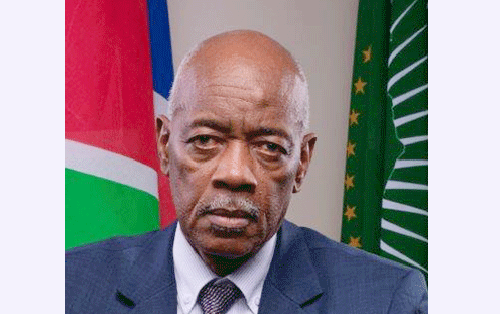Since the passing of our Founding Father Sam Shafishuna Nujoma on 8 February 2025, Namibians from all walks of life have been weighing in on the life of their revered leader.
They did that in speech, song, and poetry in style and in the most colourful tones. However, these speeches were mainly, and rightly so, linear historical narratives.
My humble contribution will bring a different dimension by positioning Nujoma as a social product in a historical process informed by cause and effect. These speeches were meant for ordinary Namibians and were not scholarly works.
I do not want to take anything away from these great speakers.
A few of my friends asked me at the memorial service held on 28 February 2025 why my pen seemed silent on this great icon’s passing. This is a late, albeit reluctant, response to that.
I have never worked closely with the founding father, except when heading the Cabinet secretariat in the Office of the Prime Minister.
He, as the then president, was the chairperson of Cabinet meetings.
That goes to explain my reluctance to write about him.
Reconstructing a historical figure of Nujoma’s pedigree is a complex process that involves piecing together fragments of the past to create a more complete understanding of that individual’s life, experiences and impact.
Secondly, no human activities take place outside time and space, hence the title of this piece.
Reconstructing Nujoma in time and space means that Nujoma was a social product of his times in Namibia.
However, he was – and most importantly so also a subjective agent of political change.
The prevailing objective conditions in colonial Namibia, notably the semi-slavery contract labour system, had to produce a Nujoma.
In the late 1940s and 1950s, the Africans in the Old Location, under the leadership of the influential Ovaherero Paramount Chief Hosea Kutako, started organising national resistance against South Africa’s colonial rule.
Nujoma and other prominent young leaders of that time, such as Mburumba Kerina, Kuaima Riruako, Moses Garoeb, etc., were under Kutako’s political tutelage.
It is said that Kutako had such confidence in Nujoma that he did not only “bless” him when he went into exile.
He also gave him his staff or walking stick, thus symbolically handing over the baton to him.
Namibia’s national resistance, which gained momentum in the late fifties and sixties, was also largely influenced by political happenings in other parts of Africa, as some African countries started to gain independence around that time.
Political events in Namibia and other parts of Africa thus shaped Nujoma’s political consciousness.
The Old Location was also a melting pot of different ethnic cultures.
Therefore, Nujoma’s nationalism was very much influenced by that culture.
It was thus little wonder that he and his wife, Kovambo, decided to marry across the ethnic divide – he being Omungandjera and she being Omuherero. In a speech read on her behalf by Nashilongo Shivute at the memorial service of her late husband, Kovambo ended by illustrating how they would typically greet each other.
When Nujoma would come home after a long day, he would greet her in Oshiwambo by saying, “Ongaalipi meekulu?” which translates to “How are you, grandmother?”
She would then respond in Otjiherero, “Ami mbauhara, ove wauhara vi presidenta?”.
Loosely translated into English, that would mean, “I am fine. How are you, Mr President?”
As a social cohesion activist, I found that the most impactful part of her speech. The former first lady was trying to teach us that in their household, they could seamlessly shuttle between these two languages without blinking an eye.
The heavens did not fall.
Many historical factors shaped Nujoma’s political consciousness over the years, like why Swapo, as a liberation movement, decided to take up arms; why the movement adopted a socialist political programme in the seventies; how the collapse of the Soviet Union and other socialist countries in the nineties and the adoption of the United Nations Security Council Resolution 435 forced the movement to adopt a more pragmatic approach at the dawn of independence in 1990, etc.
However, space would not allow me to elaborate on all these factors except that Nujoma was a social product of his times and a subjective catalyst for political change.
In other words, objective conditions in colonial Namibia “threw up” a Nujoma, but he rose to the occasion to help create subjective conditions to liberate his people.
Rest in peace, tatekulu.
*Gerson Uaripi Tjihenuna is a Commissioner of Elections in the Republic of Namibia. The views expressed here are his own, and not those of the Electoral Commission of Namibia.



